Cultural Divide: All 77 counties voted for Trump. These musicians are fighting to turn Oklahoma blue
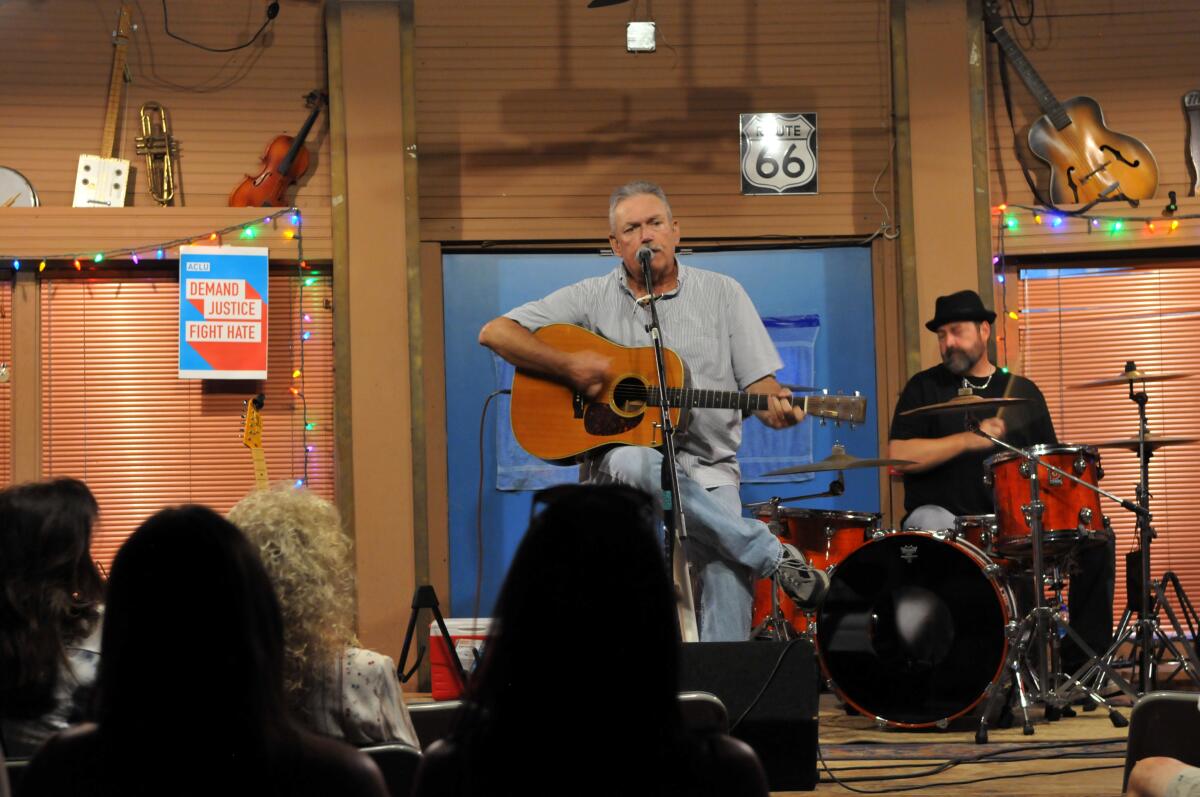
- Share via
OKLAHOMA CITY — Greg Johnson, rabble-rouser and cusser, steps past a stack of records to a mixing board and waits for Joe Baxter, a musician with hundreds of songs in his head, including one about a woman working the swing shift at a cardboard factory in a dying Oklahoma town.
It’s the kind of song Johnson likes, a parable about promises that start out pure but get bruised along the way. His revered Blue Door club — he lives in the back — invokes the everyman spirit of 1940s folk singer Woody Guthrie and a disdain for President Trump that runs as wide and ornery as the plains that stretch north to Kansas.
Johnson is a liberal in this deep-red country of Baptist preachers and rich oilmen. The Blue Door is a progressive’s sanctuary in a state where all 77 counties went for Trump. Some of the best folk and Americana artists have performed on the venue’s stage, beneath a dusty banjo and a trumpet in a low building where zithers and harps were once made. But Johnson, whose expletives flow in varying octaves, wants the nation to confront its past and rewire its future.
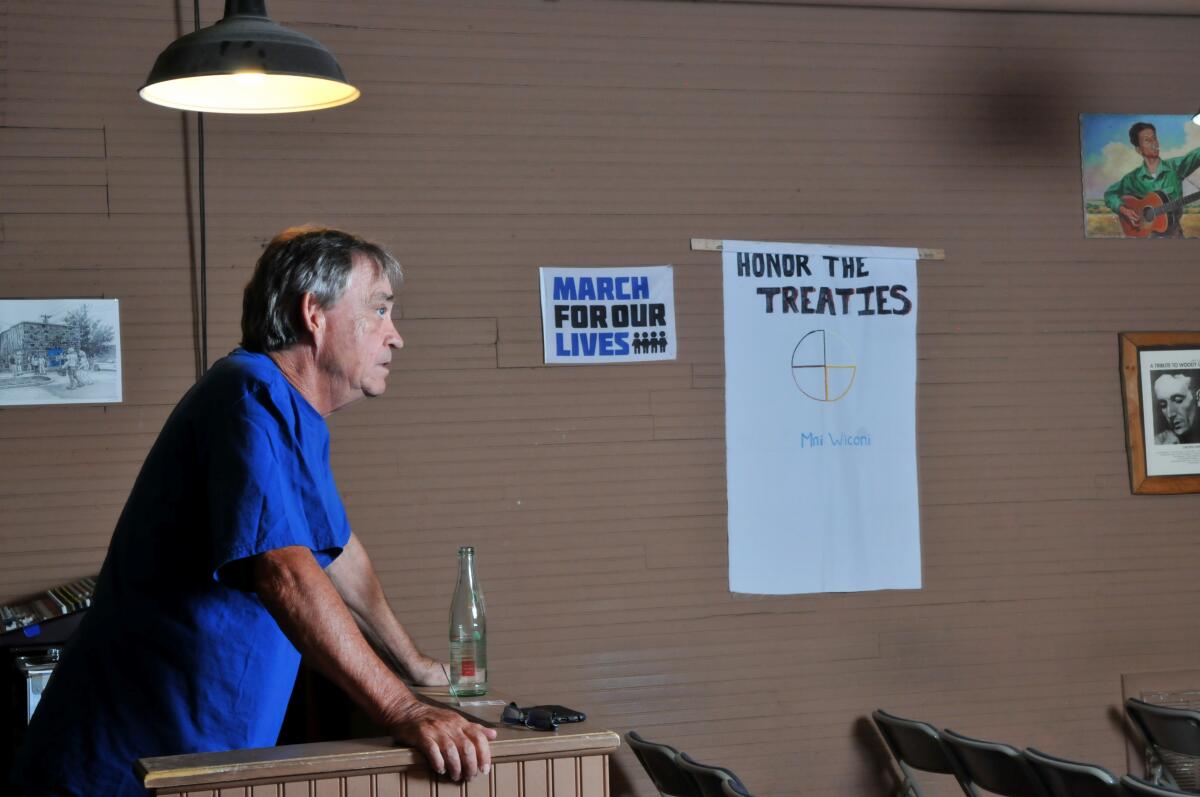
“You’ve got a country founded on genocide and built by slaves, so, well, you’ve got a lot of digging out to do,” he says as wind blows through a half-open door. “I want musicians to make a stand when they can. I’m asking people to speak out. Look at Woody. He was all about seeing what you could do in your own community. I don’t think music changes anybody, otherwise the Beatles and Jimi Hendrix would have changed us. But music can inspire the work that brings about change.”
Republicans have a roughly 175,000-vote advantage in Oklahoma, which has only one Democrat in Congress. Liberal musicians have held fundraising concerts for voter registration drives, better schools, Democratic candidates and medical marijuana. They have sung against fracking and protested in front of an Immigration and Customs Enforcement center. Many have written songs that speak to the times, including John Fullbright’s anti-fascist “Fat Man,” Jared Deck’s “Great American Breakdown” and Peggy Johnson’s scathing ballad “Sock Puppet,” which tells Trump “the world is exploding while you’re out copping a feel.”
“We’re pretty much ground zero in Oklahoma,” says Baxter, who spent 35 years working for the Air Force. “I know these Trump folks. How they are, what they think. It started with the demise of the World War II Republicans and the creating of a distrust for government. We’re in the deepest, darkest part of it in this state. I call them oil Baptists. I call it fascism.”
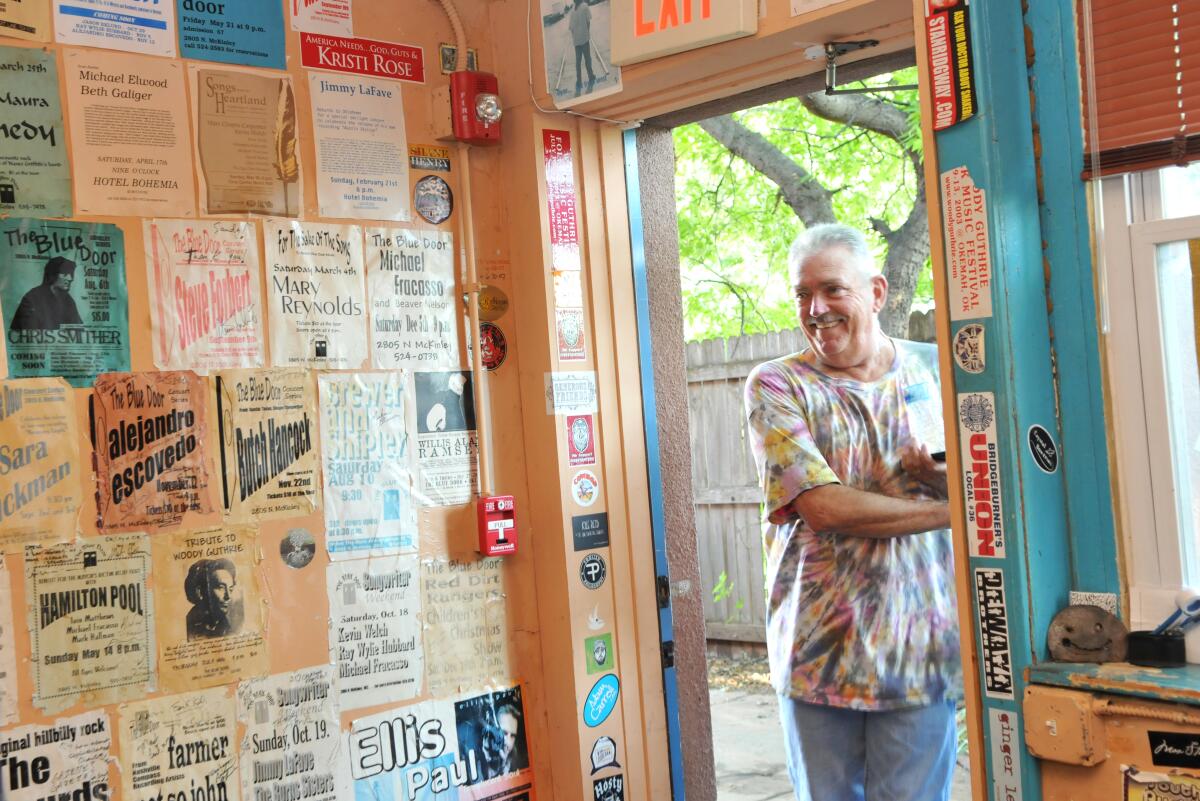
State of contradictions
Mary Catherine Reynolds, a married, gay singer-songwriter, once lived in the house that became the Blue Door. In those days, she called it “Hotel Bohemia.” She says tolerance has improved in the state in recent years, despite radio and TV conservatives “who you just wonder what planet they’re living on. But we have to get through to the other side. Just being disenchanted with Trump is not enough. They want to blame immigrants, women, homosexuals for their problems. But it’s the banks doing it to them.”
Oklahoma is a map of America’s contradictions and ironies, its noble aspirations and scarier tendencies. It can be brash and broken in a single breath. The frontier spirit cuts deep, the opioid scourge hit hard. The state houses the archives of Guthrie, an Oklahoma native, and Bob Dylan, two of the world’s most socially conscious songwriters. It is also home to the etched walls and reflecting pool at the memorial for 168 people killed in 1995 when anti-government terrorist Timothy McVeigh exploded a Ryder truck full of fertilizer in front of the federal building in Oklahoma City.
Across windblown hills and lowlands lie the Choctaw, Cherokee and Chickasaw nations. In the Greenwood district of Tulsa, African Americans, including those at Wanda J’s, which serves catfish and mashed potatoes, are reviving what was known as the “Black Wall Street,” where in 1921 white mobs attacked residents and burned homes and businesses, leaving thousands homeless and up to 300 dead in what is known as the Tulsa Race Massacre.
Elizabeth Warren was born here, but Fox News and the likes of Scott Pruitt, forced by ethics scandals to resign as Trump’s head of the Environmental Protection Agency, provide the talking points. Conservative Bluegrass musicians sing of cowboy hat patriotism; the governor this year signed a law making it legal to carry a gun without a permit. Church hymns and anti-abortion homilies ring over fields that wrought the Depression-era Dust Bowl, and for miles approaching Oklahoma City, the Devon Energy Corp. tower glimmers like a crystal blade flung down from heaven.
“This used to be a pretty progressive state,” says Brad Piccolo, singer-songwriter for the Tulsa-based Red Dirt Rangers, which recorded a live album at the Blue Door and performs at the annual Woody Guthrie Folk Festival in Okemah. “They’re preaching politics from the pulpit. There’s veiled racism. Things have flipped. Trump is making people say things they once thought but never said about racism and immigration. The only bit of hope came when Democrats and Republicans got together to legalize medical marijuana.”
A slight man in jeans, Piccolo pets his dog, Ringo, and walks through an irrigated backyard to six varieties of marijuana plants. Medicinal, of course, although he started growing way back when he had to wear camo pants. The grandson of an Italian coal miner, Piccolo has been called a “commie” (he prefers “compassionate capitalist”) and brims with truisms: “A libertarian is nothing but a Republican who smokes weed.”
The invective against immigrants bothers him. It’s a sin, he says, to stay silent if you see a picture of a child in a cage along the U.S.-Mexican border. His song “Red State Blues,” which has earned him threats that he might wake up in a hospital, is unflinching: ”I’ve got the Red state blues / I’m paying my dues in Oklahoma / If they find out you’re a liberal / They’ll try to put you in a coma / Rednecks waving Rebel flags / KKK and the Nazis in drag / I’ve got the Red state blues.”
“Those feelings have been in me for a long time,” says Piccolo, who keeps ashes of dead friends above his album collection, which includes Tito Puente and Hank Williams Jr. “It’s the influence of Woody Guthrie. The most powerful song comes to you in 10 minutes. That was a 10-minute song with no filter. You know, I took one of those tests and found out I’m left of Gandhi.”
He laughs and climbs into a car. He drives past Art Deco buildings to the Woody Guthrie Center, funded by progressive billionaire George B. Kaiser. Guthrie, who died in 1967 and wrote “This Land Is Your Land,” a song that says America belongs to the poor and dispossessed as much as anyone else, may have found it curious and amusing that the foundation of a rich man owns his archives. Piccolo stops at a glass case and stares at blistering verses about Trump’s father, Fred, scrawled in notebooks. Fred Trump owned the Brooklyn building where Guthrie, who accused Trump of not renting to blacks, lived in the early 1950s.
One passage read: “I suppose that Old Man Trump knows just how much racial hate / He stirred up in that bloodpot of human hearts / When he drawed that colored line / Here at his Beach Haven family project.”
Those lines from El Paso to Ferguson, Mo., still divide much of America. Deana McCloud, the center’s executive director, walks among Guthrie’s lyrics every day, listening to his strumming and the wire pitch of his voice. The phrase on Guthrie’s guitar read: “This machine kills fascists.” He has, she says, never lost his relevance, especially in this age of racist tweets and contempt of the other.
“Unfortunately, history will not look kindly on us, nor should it,” McCloud says. “Our musicians still realize they can change the status quo. Woody was our example. The legacy is strong with our Oklahoma artists. Many of them are independent and not tied to a big company. They don’t have a record label telling them what they can say.”
Piccolo returns home to his weed, songs and dog. He offers water and waves. The road cuts southwest, past fields and blowing trees, scattered clouds, trucks roaring along, MAGA ball caps resting on dashes, the temperature edging toward 100. Oklahoma City rises like a toy set from the earth. A daughter has left a note for her dead mother on the chain-link fence at the bombing memorial: “We will have been married for 18 years in June, and we have been blessed with three remarkable boys. I am going to be the building principal next year.”
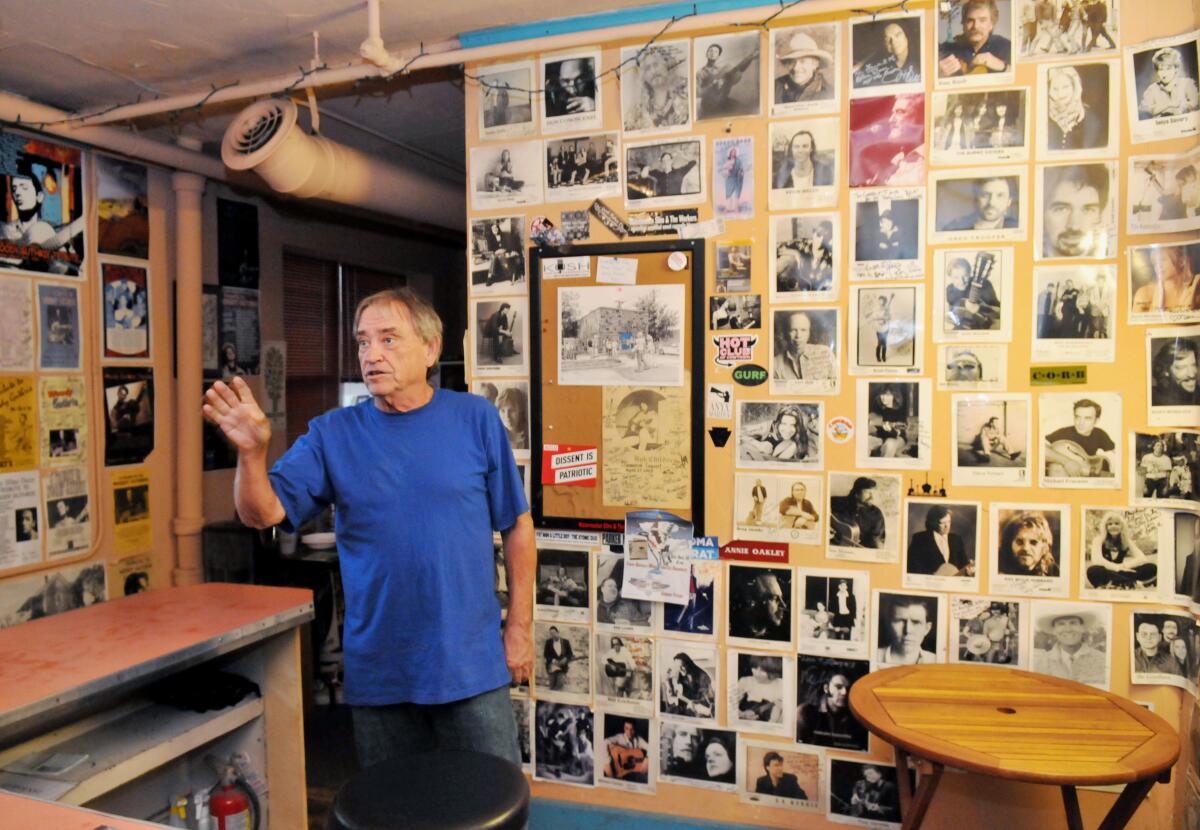
No surrender
The Blue Door has ghosts of its own. Black and white photographs and posters of musicians line the walls. Guy Clark. Chris Smither. Johnny Cash. Jimmy Webb. Walking into the place is like getting lost in a Hobbit hut, eyes and memories everywhere, a compressed vista of time. Johnson, though, is more iconoclast than sentimentalist. He’d rather vilify Trump than romanticize the past, although he is proud of organizing Guthrie tribute concerts, which he began nearly three decades ago in Austin, Texas, before moving to Oklahoma.
“Art and music are wonderful, but if people’s everyday needs are not met, it adds to nothing,” says Johnson, who started the Blue Door a quarter of a century ago. “We have to get people to think about that.”
KOSU, a public radio station operated by Oklahoma State University, canceled Johnson’s “For the Sake of the Song” show in 2017 after he disparaged Trump on air. Johnson’s retort: “So much for freedom of the press.” He’s planning to hold a get out the vote fundraiser next year to keep Democratic Congresswoman Kendra Horn, who represents Oklahoma City, in office after her 2018 upset over a Republican.
“The hustle and con of Trump are the outgrowth of Reagan materialism gone amok,” says Johnson. “My political philosophy comes from the Sermon on the Mount, the Beatitudes and a little Christian existentialism.”
As he talks, Baxter arrives with his band, the Regular Joes.
“My lighting in this place sucks,” says Johnson.
No one disagrees.
Baxter has been playing the Blue Door for years. He carries anti-Nazi stickers and has written a few protest songs. But he prefers parables and stories about people living hard lives, like the janitors, waitresses and mechanics he grew up around. He and other songwriters, who seem a mutinous platoon in a large army, calibrate their messages so as not to offend their audiences. But Baxter is unabashed on social media: “I use Nazi 10 times a day. I want everyone to start using the word.”
Johnson has never been a man of calibration. All kinds of cussing flies off him.
“(unprintable string of words) Trump,” he says.
Johnson disappears into a back room and returns wearing polished black shoes. His brown hair is towel-dried, his face creased but somehow boyish; like there’s a kid inside him who won’t surrender. He steps behind the mixing board. Baxter and his band run through a sound check, then all go out to eat. They talk about prostate cancer and the Mueller report. When they return, dark is pressing down and a breeze strokes the door. By the entrance, where Baxter has laid out CDs for sale, a man collects tickets, his hair long, his beard thick. Bass player Marco Tello has changed into a powder blue suit and boots that curl at the toes.
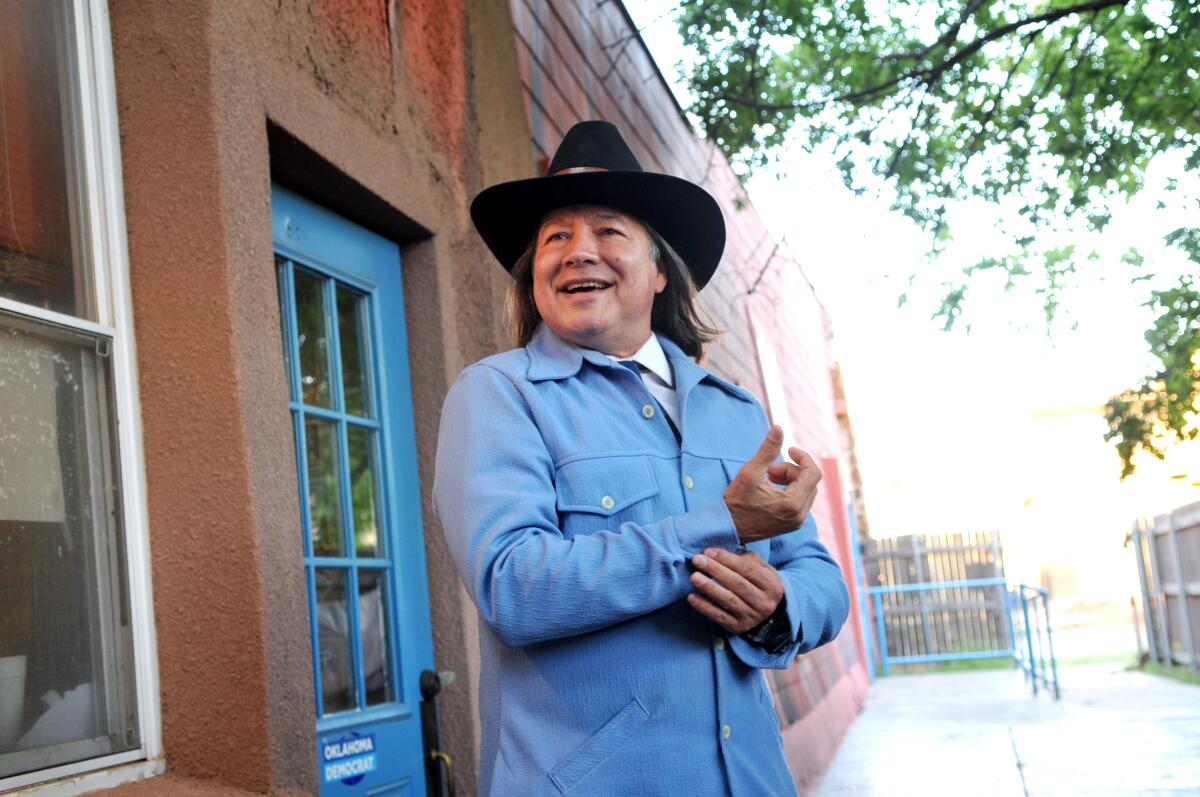
“You know, early on,” Johnson says in an echo of Piccolo’s comments, “Oklahoma had a strong progressive bent. We’ve got to get that back. There is a little revolution going on in Oklahoma City.”
About 40 people arrive, some carrying their own beer. A reggae musician follows in two women in sundresses. Baxter and his band take the stage. His voice is clear, his lyrics known to most. He sings about an old piano, a dog, the weather, his wife. He tells stories about playing in bars for years, driving home at 3 a.m., smoking nine packs of cigarettes. He talks about cold dusks descending on back porches when summer ends.
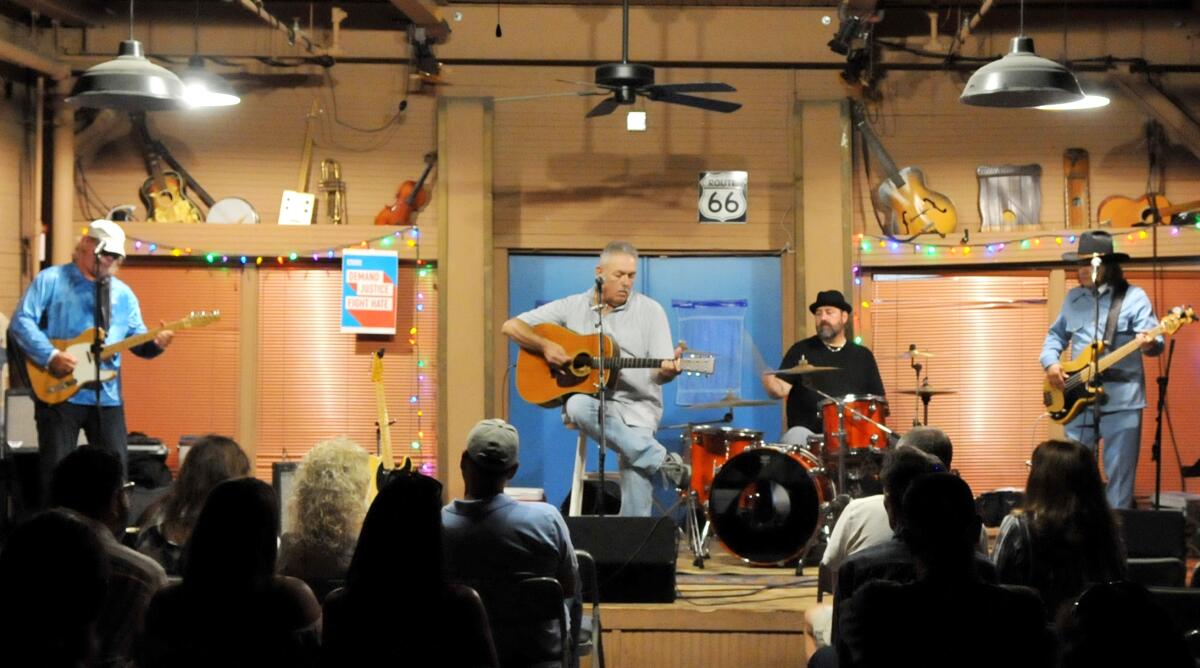
The scent of weed settles in the air. Johnson sits at the mixing board, listening. He’s sat here thousands of times, waiting for the right song and thinking that a man’s life comes down to moments when the purity of who he is meets the resolve of what he believes. Baxter, sweating in an untucked shirt, rips into “Sherry Worked Swing Shift.” It’s about the beat-up dreams of a factory woman with a no-good boyfriend living in a trailer park.
It isn’t a protest song, but it feels like one.
Politics and Culture
Cultural Divide
Read more from Jeffrey Fleishman’s series of explorations across America ahead of the 2020 election
More to Read
The biggest entertainment stories
Get our big stories about Hollywood, film, television, music, arts, culture and more right in your inbox as soon as they publish.
You may occasionally receive promotional content from the Los Angeles Times.











